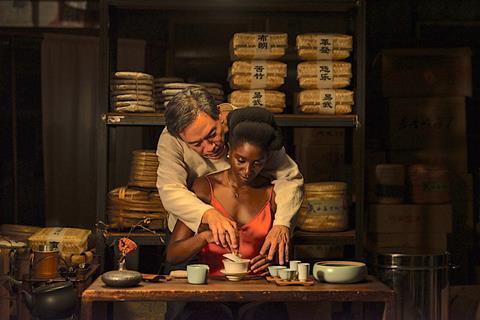An African woman seeks a new life, and new connections, in Guangzhou, China

Dir. Abderrahmane Sissako. France/Mauritania/Luxembourg/Taiwan/Côte d’Ivoire. 2024. 111mins.
A current hot field in film academia is ‘Transnational Cinema’ – the study of interconnections, economic and cultural, between different nations in a globalised world order. It’s hard to think of many films that are more thoroughly Transnational than Black Tea, the Berlinale competition entry from Mauritanian director Abderrahmane Sissako – an African-European-Asian co-production with Mandarin, French, English and Portuguese dialogue (plus singing in Bambara), about an African woman seeking a new life in China.
A magnetic central performance by Ivorian-French actress Nina Mélo
This might not seem an easy recipe for coherence, but Sissako holds it all together for a good while – not least thanks to a magnetic central performance by Ivorian-French actress Nina Mélo. Ultimately, however, the film’s eclectic ambitions and increasingly eccentric construction get the better of it, resulting in a very uneven brew.
This is the first film in 10 years from Sissako, who is generally associated with work of a strongly political tenor; notably Bamako (2006), which placed international banking on trial, and Timbuktu (2014), a caustically inventive satirical response to militant Islamism. Black Tea also has its political dimension, as becomes more explicitly evident towards the end, but for much of its run it plays as a story of female self-liberation mixed with a simmering inter-racial love story.
The film begins with a teasingly odd close-up of a black insect crawling over a field of white fabric, which turns out to be a wedding dress. We’re in Côte d’Ivoire, at a ceremony where several couples are to be married – among them, a young woman named Aya (Mélo), who at the last minute decides to turn down her philandering fiancé. A burst of the Anthony Newley/Nina Simone standard ‘Feeling Good’, performed by Malian singer Fatoumata Diawara, leads us into Aya’s new life across the globe in Guangzhou, China (these sections were in fact shot in Taiwan).
Guangzhou, it turns out, has the largest African population in Asia and an African quarter known as ‘Chocolate City’, where Aya connects with other immigrants, including the staff at local hairdressing and nail salons. She has also started work at a specialist tea shop run by a refined middle-aged man named Wong Cai (Taiwanese actor Chang Han), the divorced father of a 20-year-old son, Li-Ben (Michael Chang), who also works in the shop.
Cai is coaching Aya in the skills of tea connoisseurship in the shop’s downstairs room, and their lessons become increasingly, though discreetly, intimate, Cai guiding Aya’s hands to show her the precise art of pouring water and handling cups. Aya and Cai also start having dinner dates, at one of which Cai narrates a flashback to the days when he ran a restaurant with his then-wife Ying (Wu Ke-Xi) and when he wasn’t quite as gently empathetic as he has since become. Aya leaves, troubled, but the couple’s relationship continues in scenes of decorous tea-centred sensuousness, suggesting that the film could easily have been called The Scent of Things. In fact, ‘Black Tea’ is the nickname given to Aya by Cai’s young female assistant – apposite, says Cai, because black tea once drunk reveals a new fascinating aroma, and that’s how he sees Aya.
While we are mulling over the aftertaste of these rather forced metaphors, the film takes a bizarre side trip, flying across the globe to the Cape Verde islands of Western Africa, where Cai – after stopping off to enjoy some ballads in the local morna style – drops in on his ex-mistress and their 20-year-old daughter, who he hasn’t seen for years.
Back in Guangzhou, Aya and Cai are enjoying a quiet evening when a surprise visit from Ying, Li-Ben and his elderly grandparents lays Chinese racial prejudices on the table, pushing the film awkwardly into a more overtly political register – picking up an earlier, roughly-sketched thread about Guangzhou’s African community being endangered. By this time, however, the film has become too raggedly digressive to hold our attention so that, when Sissako pulls an utterly indigestible last-minute switcheroo, the tea is well and truly spilledcand there is no mopping it up.
Where Black Tea really engages is in the scenes between Aya and Cai, which glow with quiet intimacy thanks to Chang Han’s gentle urbanity, and especially thanks to Mélo, whose previous roles include Soleils and Girlhood. Her coolly glamorous Aya exudes an elusive warmth as a woman keenly attentive to others, reticent in revealing her own feelings – a stance which plays nicely in scenes that offer character sketches of the people around Aya, notably Wen (Huang Wei), the harassed young woman who runs a (symbolically laden) luggage shop.
The film is also remarkably handsome, with DoP Aymeric Pilarski – who made his mark with 2019 Mongolian drama Egg – emphasising the comforting darkness of enclosed spaces like the tea shop and Cai’s favourite restaurant, contrasting with the electrically-lit enclosure of Guangzhou’s shopping malls. There’s also a gorgeous sequence at a tea plantation, its rippled hillocks suggesting a huge green brain – although Sissako can’t resist an infusion of kitsch in the shape of a small, beautiful (presumably VFX) butterfly. Armand Amar’s elegant score mixes Chinese violin and African kora, plus Diawara’s vocals, to alluring cross-cultural effect.
Yet however appealing the blend sometimes is, this wildly eccentric film ultimately feels a few leaves short of a pot.
Production company: Cinefrance Studios, Archipel 35, Dune Vision
International sales: Gaumont international@gaumont.com
Producers: David Gauquié, Julien Derys, Denis Freyd, Kessen Fatoumata Tall, Jean-Luc Ormières, Charles S. Cohen
Screenplay: Kessen Fatoumata Tall, Abderrahmane Sissako
Cinematography: Aymerick Pilarski
Production design: Véronique Sacrez
Editor: Nadia Ben Rachid
Music: Armand Amar
Main cast: Nina Mélo, Chang Han, Wu Ye-Xi, Michael Chang, Huang Wei























